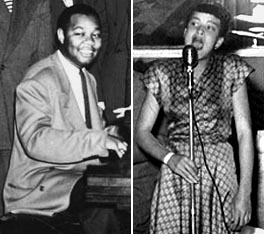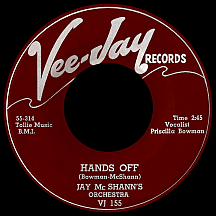JAY McSHANN'S ORCHESTRA
WITH PRISCILLA BOWMAN
Hands Off
Muskogee, Oklahoma's James Columbus McShann was motivated to do only one thing in life: play jazz, which is exactly how it played out for the majority of his 90 years. Pianist Earl "Fatha" Hines, whose Chicago-based concert broadcasts in the early days of radio blazed a trail for every other jazz musician of the 1920s, had a further reach than even he might have imagined; those radio shows could be heard late at night throughout middle America and McShann, in particular, was so fascinated by it all that he didn't wait for a chance to take lessons but learned to play on his own any time he came across an unattended piano. He worked with a local band while still in his teens and wound up with a rather silly nickname, "Hootie" (an abbreviation of "hootenanny," an informal 1930s slang term for a small town jazz gathering, bantered about long before the word was attached to folk singing soirees). The titles of some of his later recordings (most notably "Hootie Blues") bore the name, which he embraced despite its unflattering origin.
James started his own band in 1936 while passing through Kansas City, Missouri (that was the plan, at least, but he ended up staying), calling himself Jay McShann for simplicity's sake. Though barely out of his teens, his group secured a longstanding engagement at the Reno Club late in the year, replacing Count Basie, who'd relocated his red-hot band to the Windy City. By the time he'd been on the K.C. scene a couple of years (and with the formidable Count out of the way), Jay had become the city's most notorious jazz pianist. Following the path set by others, he made the move to Chicago in 1939, taking bassist Gene Ramey and drummer Gus Johnson with him; the trio had a following but opted to backtrack to Kansas City the following year.
Settling in at the Century Room, he hired 19-year-old saxophonist Charlie "Bird" Parker, who'd already worked with McShann's and Harlan Leonard's bands a couple of years earlier and had spent time in New York City (where he had a tough go of it), having returned to his home town where the competition wasn't so fierce. McShann hired a fellow Oklahoman, singer Walter Brown, who'd been performing in some of the seedier K.C. clubs, and everything seemed to fall in place as they gigged in cities thoughout the midwest and southwest, ultimately gaining the interest of Decca Records. Signed to a recording contract in 1941, sessions were held that spring in Dallas, Texas. McShann scored a hit during the summer with Brown's composition "Confessin' the Blues," a song with far-reaching influence (acknowledging its timelessness, The Rolling Stones recorded it in 1964).
Hootie and the Bird found success in New York City in 1942, tearing down the house at the Savoy Ballroom and Apollo Theater with Parker's frenzied sax solos; as a result, Charlie departed the following year when McShann's idol Hines (whose band included trumpet phenom Dizzy Gillespie) offered the possibility of bigger and better things. McShann survived the defection, promoting Jimmy Forrest to the master-sax-blower spot and later bringing in top-tier player Paul Quinichette. Al Hibbler, a blind jazz singer from Mississippi (who later performed with Duke Ellington and had his own string of solo '50s hits including "Unchained Melody"), replaced Brown and delivered silky-smooth vocals on McShann's second hit, "Get Me on Your Mind," in the summer of '43. World War II put a damper on the operation, unfortunately, as a number of his crack musicians were drafted; Jay also spent some time in the Army towards the end of the war.
In 1945, Hibbler was replaced by Jimmy Witherspoon, a more blues-oriented vocalist who made a number of records with McShann on various labels. Jay's orchestra (his brother, Pete McShann, was the drummer by this time) backed Witherspoon on "Ain't Nobody's Business," a number one rhythm and blues hit in August 1949, and its follow-up, "In the Evening," both recorded in Los Angeles for Supreme. McShann (and his "Band That Jumps the Blues") also scored a pair of instrumental hits in '49, "Hot Biscuits" and "Buttermilk," on the Down Beat label. But his biggest seller by far was still several years away.

Priscilla Bowman was born in Kansas City, Kansas, in 1928 and had been making the rounds of the smaller local clubs when she auditioned for Jay's band in the early 1950s. Joining the roster of the relatively new Vee-Jay Records of Gary, Indiana (later Chicago) in 1955, the group recorded Priscilla's tune "Hands Off," done with a standard blues structure, her vocal filled with the sultry, no-nonsense attitude familiar to fans of Dinah Washington, Ruth Brown, "Big Mama" Thornton and other hitmaking women of the day. The single was a runaway smash, hitting number one on the R&B charts in December 1955 while a similarly-arranged cover version on RPM by opposite-end-of-Missouri-born singer Donna Hightower failed in its bid to disrupt Priscilla's momentum (the song did manage some additional exposure when Damita Jo remade it for Mercury Records, under the title "Keep Your Hands Off of Him," in 1961).
Touring took its toll on sudden-star Bowman, who was unaccustomed to the rigors of the road, but she pushed forward, recording "I've Got News For You," issued with a reversed label credit, Priscilla Bowman and Jay McShann. An instrumental single by the band titled "Jay's Jam" was followed by a third Bowman/McShann disc, "Don't Need Your Lovin'," yet despite strong musicianship and vocals, these efforts sold poorly. Vee-Jay promoted Priscilla as a solo act after that, matching her with Al Smith's Orchestra on "Yes, I'm Glad" and "Sugar Daddy," both on Falcon, a VJ subsidiary. Falcon was renamed Abner (after label exec Ewart Abner) and her next disc featured group vocals by The Spaniels, who were uncredited on "I Ain't Givin' Up Nothin'" and its flip, "A Rockin' Good Way" (which became a major hit two years later when Dinah Washington and Brook Benton, cowriter of the song, dueled in-studio and sparked the public's fancy). On these records Priscilla sounded simply fabulous; her talent was on a par with the more successful R&B vocalists of the time, yet that one big hit was all she would be able to muster. After one final Abner single, "Why Must I Cry" in 1960, the exhausted young performer had no real objection to being dropped by the label.
After being out of the music business for a number of years, Priscilla Bowman resumed performing in the late '70s, appearing at venues in and around Kansas City. Jay McShann, as noted earlier, kept going well into his ninth decade, making his final recordings shortly after the start of the 21st century. Hootie and Bowman's chart-topping smash has somehow fallen into obscurity while lesser-selling hits of 1955 and '56 are celebrated as rock and roll milestones. "Hands Off" is, unjustly, one of the unsung singles of the 1950s.


